

White Wolf. Overview[edit] White Wolf has also released several series of novels based on the Old World of Darkness, all of which are currently out of print (although many are coming back into availability via print-on-demand).

Black Dog Game Factory. Black Dog Game Factory Logo Black Dog Game Factory was a label used by White Wolf, Inc. for the publication of a number of books in their original World of Darkness RPG line.
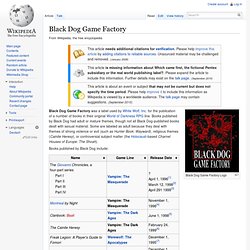
Books published by Black Dog had adult or mature themes, though not all Black Dog-published books dealt with sexual material. Some are labeled as adult because they deal with themes of strong violence or evil (such as Hunter Book: Wayward), religious themes (Cainite Heresy), or controversial subject matter (the Holocaust-based Charnel Houses of Europe: The Shoah).
Hol (role-playing game) HoL (sometimes written as "HōL") is a role-playing game created by Dirt Merchant Games and produced by Black Dog Game Factory, a subsidiary of White Wolf which produced adult oriented RPGs.
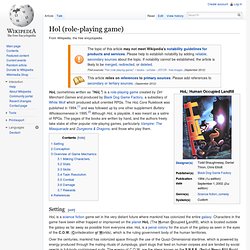
The HoL Core Rulebook was published in 1994,[1] and was followed up by one other supplement Buttery Wholesomeness in 1995.[2] Although HoL is playable, it was meant as a satire of RPGs. The pages of the books are written by hand, and the authors freely take stabs at other popular role-playing games, particularly Vampire: The Masquerade and Dungeons & Dragons, and those who play them. HoL is a science fiction game set in the very distant future where mankind has colonized the entire galaxy. Characters in the game have been either trapped or imprisoned on the planet HoL (The Human Occupied Landfill), which is located outside the galaxy as far away as possible from everyone else.
HoL is a penal colony for the scum of the galaxy as seen in the eyes of the C.O.W. Each character in HoL has five Stats: Werewolf: The Apocalypse. Along with the other titles in the World of Darkness, Werewolf was discontinued in 2004.
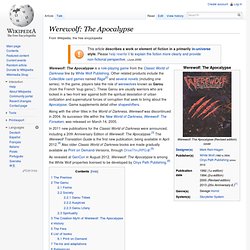
Its successor title within the New World of Darkness, Werewolf: The Forsaken, was released on March 14, 2005. In 2011 new publications for the Classic World of Darkness were announced, including a 20th Anniversary Edition of Werewolf: The Apocalypse.[3] The Werewolf Translation Guide is the first new publication, being available in April 2012.[4] Also older Classic World of Darkness books are made gradually available as Print on Demand-Versions, through DriveThruRPG.[5] As revealed at GenCon in August 2012, Werewolf: The Apocalypse is among the White Wolf properties licensed to be developed by Onyx Path Publishing.[6] Werewolf: The Forsaken. Werewolf: The Forsaken is a role-playing game set in the new World of Darkness created by White Wolf Game Studio.
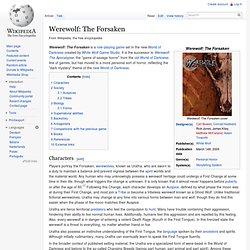
It is the successor to Werewolf: The Apocalypse, the "game of savage horror" from the old World of Darkness line of games, but has moved to a more personal sort of horror, reflecting the "dark mystery" theme of the new World of Darkness. Characters[edit] Players portray the Forsaken, werewolves, known as Uratha, who are sworn to a duty to maintain a balance and prevent ingress between the spirit worlds and the material world. Any human who may unknowingly possess a werewolf heritage could undergo a First Change at some time in their life, though what triggers the change is unknown. It is only known that it almost never happens before puberty or after the age of 60.[1] Following this Change, each character develops an Auspice, defined by what phase the moon was at during their First Change, and most join a Tribe or become a tribeless werewolf known as a Ghost Wolf.
Mage: The Ascension. Mage: The Ascension is a role-playing game based in the World of Darkness, and was published by White Wolf Game Studio.
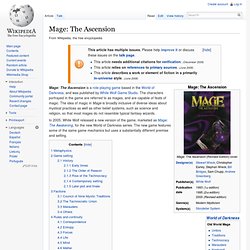
The characters portrayed in the game are referred to as mages, and are capable of feats of magic. The idea of magic in Mage is broadly inclusive of diverse ideas about mystical practices as well as other belief systems, such as science and religion, so that most mages do not resemble typical fantasy wizards. In 2005, White Wolf released a new version of the game, marketed as Mage: The Awakening, for the new World of Darkness series. The new game features some of the same game mechanics but uses a substantially different premise and setting.
[edit] Demon: The Fallen. Demon: The Fallen is a role-playing game and a fictional setting from the World of Darkness line by White Wolf Game Studio.
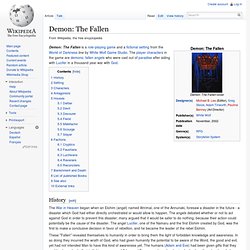
The player characters in the game are demons; fallen angels who were cast out of paradise after siding with Lucifer in a thousand year war with God. History[edit] The War in Heaven began when an Elohim (angel) named Ahrimal, one of the Annunaki, foresaw a disaster in the future - a disaster which God had either directly orchestrated or would allow to happen. The angels debated whether or not to act against God in order to prevent this disaster; many argued that it would be safer to do nothing, because their action could potentially be the cause of the disaster. Mummy: The Resurrection. Mummy: The Resurrection is a role-playing game released by White Wolf Game Studios, where the players assume the role of resurrected mummies living in the modern world.
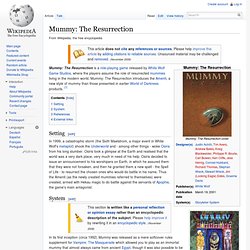
Mummy: The Resurrection introduces the Amenti, a new style of mummy than those presented in earlier World of Darkness products. [1] Setting[edit] In 1999, a catastrophic storm (the Sixth Maelstrom, a major event in White Wolf's metaplot) shook the Underworld and - among other things - woke Osiris from his long slumber. Osiris took a glimpse at the Earth and realised that the world was a very dark place, very much in need of his help. Osiris decided to issue an announcement to his worshipers on Earth, in which he assured them that they were not forsaken, and then he granted them a new spell - the Spell of Life - to resurrect the chosen ones who would do battle in his name.
Changeling: The Dreaming. Changeling: The Dreaming was part of White Wolf Game Studio's original "World of Darkness" role playing game line.
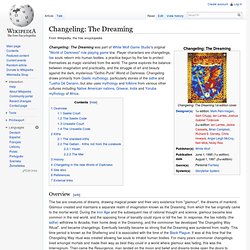
Player characters are changelings, fae souls reborn into human bodies, a practice begun by the fae to protect themselves as magic vanished from the world. The game explores the balance between imagination and practicality, and the struggle of art and beauty against the dark, mysterious "Gothic-Punk" World of Darkness. Changeling draws primarily from Gaelic mythology, particularly stories of the sidhe and Tuatha Dé Danann, but also uses mythology and folklore from various other cultures including Native American nations, Greece, India and Yoruba mythology of Africa. Overview[edit] Wraith: The Oblivion. Wraith: The Oblivion is a role-playing game designed by Mark Rein·Hagen.
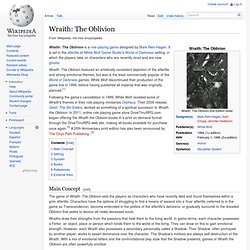
It is set in the afterlife of White Wolf Game Studio's World of Darkness setting, in which the players take on characters who are recently dead and are now ghosts. Wraith: The Oblivion featured an artistically consistent depiction of the afterlife and strong emotional themes, but was is the least commercially popular of the World of Darkness games.
White Wolf discontinued their production of the game line in 1999, before having published all material that was originally planned.[1] Main Concept[edit] World of Darkness. World of Darkness are three related but distinct fictional universes created as settings for supernatural horror story themed role-playing games. The first was conceived by Mark Rein-Hagen, while the second was designed by several people at White Wolf Gaming Studio, which Rein-Hagen helped to found.[1] The first two World of Darkness settings have been used for several horror-themed role-playing games that make use of White Wolf's storyteller/storytelling system, as well as Mind's Eye Theatre, a live action role-playing game based on the core games. The third, Monte Cook's World of Darkness, created by Monte Cook based on the first two World of Darkness settings, includes only a single product.
Terminology and themes[edit] Storytelling System. The Storytelling System, formerly Storyteller System, is a role-playing game system created by White Wolf, Inc. in 1991 that premiered in Vampire: The Masquerade, a part of the World of Darkness series.[1] History[edit] Storyteller System[edit] While on the road to Gen Con '90, Mark Rein·Hagen came upon the idea of a new game design that would become Vampire: The Masquerade. Tom Dowd, co-designer for Shadowrun, worked with Rein-Hagen to adapt the core mechanics from his previous game success to use d10 instead of d6 for calculating probability.[1] Over the next few years, several games were published under this rule set. Ars Magica. Ars Magica was one of the first examples of a Troupe system.
Early editions recommended that the players collaborate to create the campaign world and story: Each player having an opportunity to be Story Guide. Street Fighter: The Storytelling Game. Game cover Street Fighter: The Storytelling Game is a role-playing game based on the Street Fighter video game series. Exalted. Exalted is a role-playing game published by White Wolf Publishing. The game is classified as high fantasy, but may be more accurately described as "mythic fantasy", as the developer specifically avoided drawing on J.
R. R. Tolkien, but rather turned to a mixture of world mythologies, as well as manga for inspiration.[1] The third edition of the game is currently in development, with an initial release scheduled for December, 2013.[2] First and Second Editions are no longer in development. Orpheus (role-playing game) Geist: The Sin-Eaters. Trinity (role-playing game) Players have a choice of six "Orders" for their characters to join. Each Order possesses a mastery over a specific "Aptitude", a category of psionic powers. Each Order is based in a specific geographic location, often the homeland of its founder, and is heavily influenced by local culture. Actually, there are eight "Orders" in the Trinity Universe, but one only became playable after some metaplot hooks made it so, and the other has almost been exterminated by the year where the playable timeline begins.
Adventure! Adventure! Aberrant. Setting[edit] Scion (role-playing game) Scion is a series of role-playing games published by White Wolf, Inc and Onyx Path Publishing. The first core rule book, Scion: Hero. was released on April 13, 2007. The second volume, Scion: Demigod, was released on September 12, 2007, and the third, Scion: God, was released on January 23, 2008. The Scion Companion began release in sections March 2008, as a PDF direct download. Scion: Ragnarok was released on January 21, 2009.[1] Vampire: The Masquerade. Kindred of the East. Promethean: The Created. Hunter: The Reckoning. Hunter: The Vigil. Changeling: The Lost. Vampire: The Requiem. Mage: The Awakening. West End Games. Ghostbusters (role-playing game) Paranoia (role-playing game) Torg. D6 System. D6 Space. Masterbook. DC Universe Roleplaying Game. The Metabarons Roleplaying Game.
Star Wars: The Roleplaying Game (West End Games) Star Wars Miniatures Battles. Chaosium. Stormbringer (role-playing game) Michael Moorcock. Eternal Champion. Elric of Melniboné. Stormbringer. Pendragon (role-playing game) Green Knight Publishing. Different Worlds. Prince Valiant (role-playing game) Worlds of Wonder (game) Ringworld (role-playing game) Nephilim (role-playing game) Ringworld (role-playing game) Elfquest. Dorian Hawkmoon. Superworld. Call of Cthulhu (role-playing game) Lynn Willis. Sandy Petersen. H. P. Lovecraft. Pagan Publishing. Delta Green. CthulhuTech. Cthulhu Mythos. Dream Cycle. Lovecraftian horror.
Avalon Hill. RuneQuest. Mongoose Publishing. HeroQuest (role-playing game) Glorantha. RuneSlayers. Steve Perrin. Tales from the Floating Vagabond. Greg Stafford.